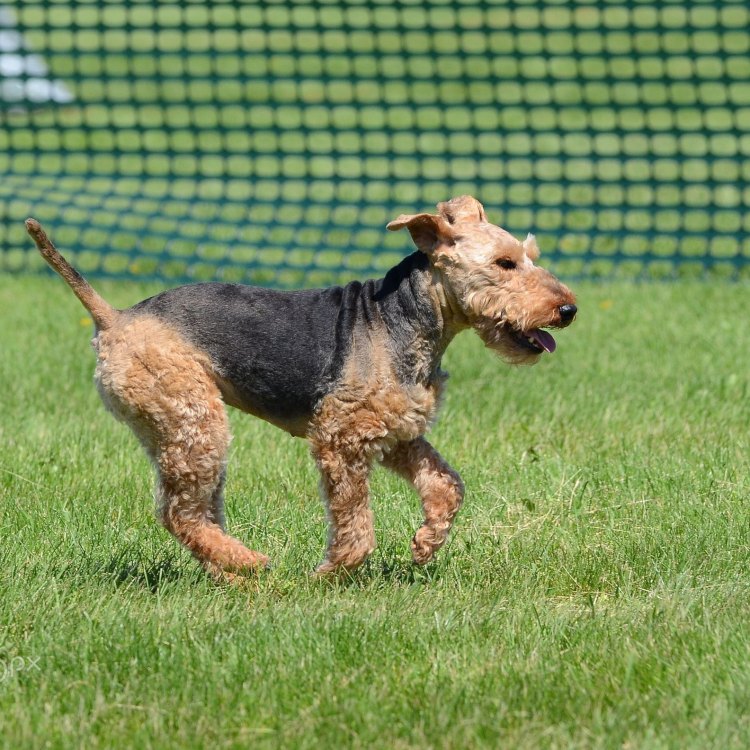
Welsh Terrier
35 - 39 cm
The Welsh Terrier, a beloved member of the Canidae family, is a small yet sturdy breed with a compact body measuring between 35-39cm. These friendly dogs can be found in grasslands and forests, making them the perfect companion for adventurous walks and outdoor explorations. With their charming personalities and adorable looks, Welsh Terriers are a popular choice for pet owners worldwide.
Animal Details Summary:
Common Name: Welsh Terrier
Kingdom: Animalia
Habitat: Terrestrial
The Lovable Welsh Terrier: A Small but Mighty Companion for Life
When it comes to choosing a pet, there are many factors to consider – size, temperament, grooming requirements, and more. For those looking for a loyal, playful, and affectionate companion that is small but sturdy, the Welsh Terrier is an excellent choice. A member of the Canidae family, this breed may be small in size, but it packs a punch with its charming personality and distinctive physical features.A Brief Introduction to the Welsh Terrier
Scientifically known as Canis lupus familiaris, the Welsh Terrier is a breed of dog that originated in Wales, as evident from its name Welsh Terrier. It falls under the Animalia kingdom, Chordata phylum, Mammalia class, and Carnivora order, making it a close relative of wolves, foxes, and other domestic dogs. This lively and spirited breed is a favorite among dog lovers for its intelligence, energy, and adaptability.The Welsh Terrier is a small-sized dog that typically weighs between 9-13 kg and stands at a height of 35-39 cm. Its body shape is described as small and sturdy, with a broad skull and a short, strong back. Its coat is hard, wiry, and weatherproof, with a black and tan coloration that gives it a distinctive and eye-catching appearance.
History and Origin
The Welsh Terrier breed can trace its roots back to the 18th century when it was developed in Wales to hunt and kill vermin, such as rats, badgers, and foxes. Farmers and quarrymen favored this breed for its robust and fearless nature, which made it an excellent working and hunting dog.However, the rise of the industrial revolution led to a decline in the need for vermin-hunting dogs, and the Welsh Terrier nearly became extinct. Fortunately, dedicated breeders in Wales and England worked to preserve the breed, and by the 1880s, the Welsh Terrier was recognized as a distinct breed by the Kennel Club in the UK White Bass. Today, it is a popular breed worldwide, known for its friendly nature and compact size.
Habitat and Feeding Habits
As a terrestrial animal, the Welsh Terrier is most comfortable living in grasslands and forests, where it can run around and explore. However, this breed adapts well to urban environments as long as it gets enough exercise and mental stimulation. As a hunting dog, the Welsh Terrier is a carnivorous feeder, and its diet should consist of high-quality protein sources such as meat and fish, as well as essential vitamins and minerals.Geographical Distribution and Country of Origin
The Welsh Terrier may have originated in Wales, but it is now a popular breed worldwide. It can be found in homes across the United Kingdom, Europe, North America, Australia, and other parts of the world. Due to its adaptability, the Welsh Terrier can thrive in a wide range of climates, making it a suitable pet for many different countries.Personality and Temperament
One of the most endearing qualities of the Welsh Terrier is its friendly and affectionate nature. This breed is known for its loyalty and dedication to its human family, making it an ideal companion for life. It is also very playful and energetic, always ready for a game or adventure. However, the Welsh Terrier can be protective and will bark to alert its family of any potential danger, making it a great watchdog.Training and Grooming
As an intelligent and eager-to-please breed, the Welsh Terrier is relatively easy to train and responds well to positive reinforcement techniques. With consistent training and socialization, it can learn various tricks and commands, making it an impressive and well-behaved pet.However, like most terrier breeds, the Welsh Terrier has a wiry and weather-resistant coat that needs regular grooming to keep it in top condition. This includes brushing at least once a week and occasional trips to a professional groomer to trim and shape the coat. The Welsh Terrier does not shed much, making it a suitable breed for those with allergies.
Health and Care
The Welsh Terrier is generally a healthy breed with a lifespan of 12-15 years. However, like any dog, it is prone to certain health issues, and potential owners should be aware of them. These include allergies, skin problems, glaucoma, and hip dysplasia. Regular visits to the vet and proper care can help prevent and manage these health conditions, ensuring a happy and healthy life for the Welsh Terrier.As a highly active breed, the Welsh Terrier requires plenty of exercise to maintain its physical and mental well-being. Daily walks and playtime in a fenced yard are essential to keep this breed happy and healthy.
A Companion for Life
In conclusion, the Welsh Terrier may be a small breed, but it makes an excellent and loving companion for life. Its charming personality, energy, and adaptability make it a popular choice for families and individuals alike. This terrier is proof that good things come in small packages, and it is sure to bring joy and companionship to anyone lucky enough to have it in their lives.

Welsh Terrier
Animal Details Welsh Terrier - Scientific Name: Canis lupus familiaris
- Category: Animals W
- Scientific Name: Canis lupus familiaris
- Common Name: Welsh Terrier
- Kingdom: Animalia
- Phylum: Chordata
- Class: Mammalia
- Order: Carnivora
- Family: Canidae
- Habitat: Terrestrial
- Feeding Method: Carnivorous
- Geographical Distribution: Worldwide
- Country of Origin: Wales
- Location: Grasslands, forests
- Animal Coloration: Black and tan
- Body Shape: Small and sturdy
- Length: 35 - 39 cm

Welsh Terrier
- Adult Size: Medium
- Average Lifespan: 12 - 15 years
- Reproduction: Sexual
- Reproductive Behavior: Mating season
- Sound or Call: Barking
- Migration Pattern: Non-migratory
- Social Groups: Family groups
- Behavior: Friendly, intelligent, alert
- Threats: None known
- Conservation Status: Not threatened
- Impact on Ecosystem: None known
- Human Use: Companion dog
- Distinctive Features: Wirehaired coat, sturdy build
- Interesting Facts: The Welsh Terrier is one of the oldest terrier breeds.
- Predator: None known

Canis lupus familiaris
The Welsh Terrier: A Loyal and Intelligent Companion
When one thinks of a dog, the image that comes to mind is that of a loyal companion, a trusted friend who will never leave your side. Many breeds of dogs fit this description, but the Welsh Terrier stands out as a breed that combines intelligence, loyalty, and an energetic personality. With a medium-sized wirehaired coat and a sturdy build, this breed is a true embodiment of the saying "good things come in small packages."The Origins of the Welsh Terrier
The Welsh Terrier is one of the oldest terrier breeds, with its origins dating back to the early 19th century in Wales, United Kingdom PeaceOfAnimals.Com. In its early days, this breed was used for hunting small prey, such as rats, rabbits, and badgers. Their small and agile bodies allowed them to navigate through dens and burrows with ease, making them expert hunters. Over time, the Welsh Terrier's popularity grew, and they were also used for fox hunting, guarding, and as companion dogs.Distinctive Features
One of the most striking features of the Welsh Terrier is its wirehaired coat, which makes it stand out amongst other terrier breeds. This coat has a hard and dense texture, providing excellent protection from harsh weather conditions. The outercoat is typically black and tan, giving them a striking appearance. Their sturdy build makes them well-suited for tough terrain and activities, such as hiking and agility training.Behavior and Temperament
The Welsh Terrier is known for its friendly, intelligent, and alert behavior. As a family dog, they are loyal and make great companions for children and adults alike Warbler. Due to their history as hunters, they have a high prey drive and may chase small animals, so proper socialization is necessary to prevent any unwanted behavior. This breed is also highly trainable and eager to please, making them suitable for various roles, including search and rescue dogs.Reproduction and Reproductive Behavior
The Welsh Terrier is a sexual reproducer, and like most dogs, they have a mating season. This season typically occurs in the spring, when the weather is warmer, and food is more abundant. During this time, male Welsh Terriers become more territorial and aggressive as they compete for female attention. Breeding between two healthy and well-bred Welsh Terriers can result in a litter of 3-6 puppies, with an average gestation period of 63 days.Sound or Call
Barking is the primary vocalization of the Welsh Terrier, and it is often used to alert their owners of any potential danger or strangers approaching. As a vocal breed, they may also bark out of boredom or excitement. While this behavior may be annoying for some, a well-trained Welsh Terrier will only bark when necessary and can be easily trained to stop barking on command.Social Groups
As a family dog, the Welsh Terrier is known for its strong attachment to its owners and forms a close bond with them. However, they also do well in social groups, such as training classes or playgroups. When properly socialized, they can get along with other dogs and pets, making them a perfect addition to multi-pet households.The Welsh Terrier's Lifespan
With proper care, the Welsh Terrier has an average lifespan of 12-15 years. As with any breed, regular exercise, a nutritious diet, and regular visits to the veterinarian are essential for maintaining their health and well-being. As they age, they may develop health issues common to terrier breeds, such as hip dysplasia and allergies. However, with early detection and proper care, these can be managed, ensuring a long and healthy life for your furry companion.Impact on Ecosystem and Threats
As a domesticated breed, the Welsh Terrier has no known impact on the ecosystem. They do not migrate and do not pose any threat to local wildlife. Moreover, there are no known threats to this breed, and their conservation status is not listed as threatened.Human Use
While originally bred as working dogs, the Welsh Terrier has become a popular companion dog. Their friendly and loyal nature, combined with their intelligence and trainability, make them an ideal choice for families and individuals looking for a dog to join their household. They are also often used as therapy dogs, providing comfort and emotional support to those in need.Final Thoughts
In conclusion, the Welsh Terrier is a loyal, intelligent, and energetic breed, making them an excellent addition to any household. Their distinctive wirehaired coat and sturdy build make them stand out amongst other terrier breeds. And while they have a strong prey drive, proper training and socialization can help to bring out the best in these dogs. With a lifespan of 12-15 years, they will be a devoted and loving companion for many years to come.

The Lovable Welsh Terrier: A Small but Mighty Companion for Life
Disclaimer: The content provided is for informational purposes only. We cannot guarantee the accuracy of the information on this page 100%. All information provided here may change without prior notice.












